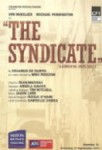Il sindaco del rione Sanità – The Syndicate
A new production of Eduardo De Filippo’s Il sindaco del rione Sanità has been presented at the Chichester Festival Theatre in a new version by Mike Poulton, directed by Sean Mathias with the title The Syndicate. The play was premièred at the Minerva Theatre, Chichester, on the 21st July 2011. It then moved to Milton Keynes Theatre, where it remained from the 17th until the 21st September.
The main characters were played by Ian McKellen (Don Antonio Barracano) and Michael Pennington (Doctor Fabio Della Ragione).
It is a play in three acts, written in 1960 and set in Naples. The protagonist, Antonio Barracano, is a local padrino who governs crime in the district where he lives administering his own justice in a system parallel to the official one. He has been helped for thirty five years by the loyal Doctor Della Ragione, who performs improvised surgery in makeshift operating theatres arranged in the Barracanos’ residence. An affectionate family and obedient employees sustain this local despot in his crazy project of making the world ‘meno rotondo ma un poco più quadrato’. In the end, he will be killed by Arturo Santaniello, an evil man who makes the life of his son Rafiluccio such a misery that the young man decides to kill his father, but before doing this, he seek advice from Barracano. However, his desire to resolve the conflict between father and son will prove fatal for him. The finale of the drama establishes a new principle, in contrast with the one suggested by the protagonist, denting every legitimacy of private justice based on connivance and silence.
Both Ian McKellen and Michael Pennington have played roles in De Filippo’s plays before. Ian McKellen was Antonio Jovine in Napoli Milionaria!, translated by Peter Tinniswood using Scouse, and directed by Richard Eyre in 1991 in the Lyttleton at the Royal National Theatre. Michael Pennington played Domenico Soriano in the 1998 Filumena Marturano interpreted by Judy Dench, in a translation by Timberlake Wertenbaker.
Since I hadn’t had the privilege to see those productions, I was thrilled to admire these outstanding figures in action in the same play, and I could appreciate first-hand their exquisite acting. Some doubts were cast, however, on the director’s choice to portray Barracano as an unconvincing ‘cool guy’ at the venerable age of 75, still willing to prove himself in boxing. Equally unimpressive was the over-gesticulating Cherie Lunghi/Donna Armida Barracano, whose Italian accent seemed to bring us back to the old days of the 1970s Zeffirelli’s productions.
A brief note on the language of the translation, rendering the Neapolitan dialect of De Filippo in Standard English, to underscore that the question of dialect translation is still unanswered, as the subtleness of it and the cultural references remain confined within the source text.
The modernity of De Filippo’s plays is still perceptible in this new translation which is a good account of the live interest for this author and his themes in twenty-first century England.
by Alessandra De Martino, University of Warwick
